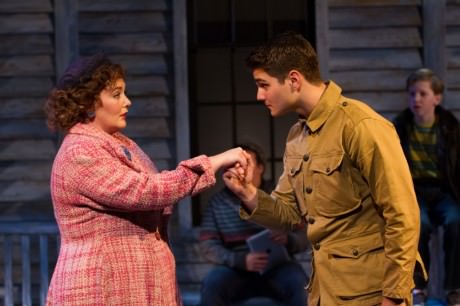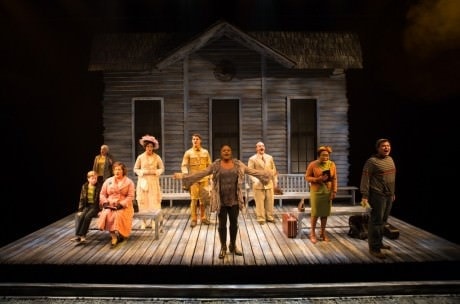As the introductory letter in the Signature Theatre’s program proudly proclaims, it’s “an exciting time at Signature,” and Signature Theatre’s production of Crossing is certainly no exception. For those you who haven’t heard, Signature Theatre is taking on a tremendous feat by presenting multiple new works in a single season: Crossing in the MAX, and Pride in the Falls of Autrey Mill in the ARK.

As a work in progress for over five years now under the direction of Signature’s Artistic Director Eric Schaeffer, Crossing is no stranger to the Signature Theatre: with music and lyrics by Matt Conner and book by Grace Barnes, Signature hosted a workshop of the project a couple years ago and a concert of the music last year. Accordingly, Signature Theatre’s production of Crossing is still very much a work in progress, and, while there were still details that needed to be ironed out and tweaks to be made throughout, it is filled with brilliant moments.
Eric Schaeffer’s set design takes us to a train station platform across varying decades, Crossing tells the tale of eight weary occupants of a train station: some traveling, some waiting for their loved ones to return, and some, frankly, just waiting. As the audience is gradually acquainted with the life stories of each one of these travelers, the train tracks become a metaphor for the journey upon which each one of the characters embark. Each song reinforces this central notion that life, itself, is ephemeral, and, with every moment, one has the opportunity to change course—hence, the musical’s literal name: Crossing.
With characters that range from a civil rights marcher in 1963 (Ines Nassara) to a soldier and mother from World War I (Austin Colby and Peggy Yates), to a wealthy man from the Great Depression (Chris Sizemore), to a European backpacker from 2013 (Christopher Mueller), the narratives from various decades are intertwined with one another—creating a unified sense of space across a fluid conception of time.
Opening the evening was a song entitled “Here I Am,” in which the entire company is presented on stage—each sequentially singing a single motif which, upon the closing refrain, was layered over one another in a rich, textured style that was used repeatedly throughout the evening (excellent musical direction by Gabriel Mangiante and orchestrations by August Eriksmoen). This musical treatment was repeated throughout the evening, which grounded the plot in a uniform melody that helped to provide some consistency in an otherwise fluid narrative that bent time to achieve its intended purpose.
One of the most impressive arrangements was in “Follow the Drinking Gourd” performed by the civil rights marcher (Ines Nassara) and the character titled “Unknown Woman” (Nova Y. Payton). The song, which alluded to Harriet Tubman and gospel music, was powerful, echoing sentiments of change and the courage to fight for equality that are still strikingly reminiscent of the modern era. While the orchestrations were indeed powerful, perhaps the most potent moments of the piece were when the two women sang a capella—harmonizing in a way that underscored the intimacy and sisterhood between the two women.
The other performance that truly stood out for me was “After the Rain”—the song performed by the unknown woman prior to the Finale. With a high vibrato with a full belt and key changes throughout, the song was a much-awaited showcase of Payton’s vocal power. With a certain rasp to her voice, Payton masterfully commanded the attention of the audience, and, to put it bluntly, nailed it. Standing on a bench shrouded in a pool of blue light to create the illusion of rain, (provided by Lighting Designer Chris Lee), she sang beautifully and powerfully of how rain washes away the past and provides a clean slate to all, a perpetual opportunity for renewal and rebirth.
There were certainly some universal themes that made the work relatable. The central theme—which anyone who has ever traveled alone before can relate to—is a sense of humanity, that every single person with whom we encounter, we have the potential to touch in profound and meaningful ways. Thus, as one of the characters puts it, “We are part of everyone we cross.” It’s up to us to leave an impression, to make it count.
There are certain risks that arise in producing world premieres, and Crossing had its fair share of potential improvements. For instance, certain songs seemed oddly repetitive or out of place, and, overall, a sense of character development was lacking. While individual songs were powerful, the narrative arc of the entire piece didn’t seem quite developed enough, and the script could have afforded each character the opportunity to have more depth. While done well for some characters (like the wealthy man, who we learn is suicidal), I was left confused bout how to feel about many of the characters. For instance, we learn very little about a child of one of the women who is waiting at the train station or the mother of a soldier who is sending off her son to war. The piece only scratches the surface of broader issues about childhood innocence or the savagery of war, which might be deepened in future productions of the work.

Crossing is very much still a work in progress, but that’s precisely the reason why you must go and see it. Seeing something polished is fantastic, but there is something incredibly fulfilling about seeing a piece that isn’t frozen, a piece in which each actor and actress is meticulously creating their role. As director Eric Schaeffer puts it, “Crossing breaks every rule in its form and structure, and it promises to be an exciting experience.”
Crossing—itself—is at a crossroads, and with the continued evolution of this project, it has the potential for greatness.
Running Time: Approximately 90 minutes, with no intermission.
Crossing plays through November 24, 2013 at Signature Theatre—4200 Campbell Avenue in Arlington, Virginia. For tickets, call the box office at (703) 820-9771, or purchase them online.
LINK
Crossing (Concert) at Signature Theatre by Don Michael Mendoza.




